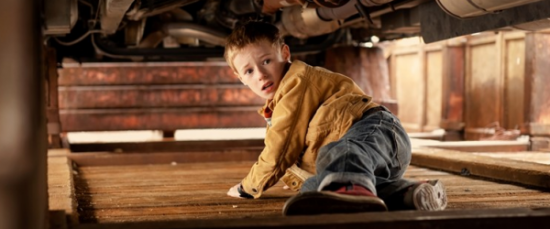Review: The Young and Prodigious T.S. Spivet
Synopsis: After designing the world’s first perpetual motion machine T.S. Spivet is selected for the prestigious Baird award. Unbeknownst to the selectee panel, however, their chosen prize-winner is only 12. Not wanting to bother his emotionally detached family but recognizing the significance of the award T.S. embarks on a lone trip across America to meet his peers, dealing with familial demons and the colourful folks he meets – or runs from – along the way.
If you need one reason to go and see The Young and Prodigious T.S. Spivet, it’s director Jean-Pierre Jeunet. If you need four more, they are: actor Kyle Catlett who plays the titular prodigy; superbly gorgeous cinematography courtesy of Thomas Hardmeier; homely country music, provided by Denis Sanacore, direct from his living room; and the warm, uplifting feeling that fills you up from the film’s start to end.
An adaptation of Reif Larson’s book of almost the same name (swap “Young and Prodigious” for “Selected Works Of”), T.S. Spivet comes with a guarantee of lovability thanks to the ever-visual, imaginative Jean-Pierre Jeunet. Only the director of creative wonders like Amélie, Micmacs and Alien Resurrection (yes!) could make a child-road trip with so much delicate and quirky heart. It should also come as no surprise that it would be he who takes all of the gimmick away from 3D film-making, instead making the method aboutart. At one point in the film there is a close-up shot of some wheat against a mountainous backdrop as T.S. traverses the road that kicks seven shades of grass out of Avatar‘s silly glowing flowers, and that’s just an exposition shot! Heck, Weetabix, get on it – you’ll be selling that stuff by the cartload if you can even badly mimic what Jeunet and Thomas Hardmeier do with their gorgeous Americana landscapes. Rich, true colours and strong contrasts fill every shot – T.S. Spivet really is a visual treat.
A huge amount of the film’s success also rests on the young shoulders of its star, Kyle Catlett. Incidentally, Catlett strikes a remarkable resemblance to the claymation version of James from 1996’s James and the Giant Peach – another ‘road-trip’ film with distinctly French undertones about family. From his sort-of-red hair and elongated face to his animated features and emotional scope, Catlett holds the screen well. Only making the character more enjoyable is his ability to deliver dialogue well beyond his years in a believable way, meaning that he holds his own against talents like Helena Bonham Carter and Callum Keith Rennie. T.S. is the kind of kid stuck in the middle of an emotionally detached family (that does love him, they just don’t show it often) that immediately makes you like him. Not only is he a naturally likable kid but his genius is a drawing factor. Many of the film’s laughs come directly from his smartness – be it him proving his teacher wrong on a subject by opening a copy of Discovery magazine in class in which his published argument is lauded by peers, or his determination to eat a hot dog from a franchised vendor despite knowing the exact crap that goes into them; he’s the perfect genius loner child. Really, the film is like a nicer version of Mathilda but with more road-tripping and less telekinesis, child abuse and wrapped candies.
It would seem that much was dropped from the 400 page book, but enough is kept to stay fans – particularly with Jeunet’s (suited) visual style wherein the book’s many diagrams, maps, pop-up creations and invention blueprints float out of the screen. Alongside the surreal cutaways or speech bubble-like monologues, Jeunet’s ADD imagination is smart and universally enjoyable. 3D isn’t an “experience” here, but an artistic treat.
Complimenting all of this is the aforementioned score: a series of touching themes composed by Denis Sanacore and his wife using almost exclusively an acoustic guitar, a piano and a violin. Whilst the music is simply melt-away country pleasantry, adding to the family feel of the film is the fact that, when Jeunet heard the soundtrack as recorded in Sanacore’s own living room, he decided against recording it again in a studio. Whilst the musically untrained ear cannot distinguish this, the fact alone feels great as we enjoy panoramic country landscapes and naive child-play.
If there is one complaint to be had it is that the film’s third act, where T.S. reaches Washington DC to collect his prestigious award feels slightly contrived in tone. When Jeunet and Hardmeier are in the country they do wonderfully, but once we are surrounded by tarmac and man-made right angles there’s something off about the whole affair – but then, given the two countryside-filled acts that precede it, maybe that’s the point.
Do not mistake the above for hyperbole, T.S. Spivet really is just a simple, touching tale of family, genius, guilt and identity. If you’re not within driving distance of some fields, nip on down to the local Whole Foods, nab some hay from any of the pretentious displays and head to the cinema this Father’s Day for a bit of weepy heart and chortles.
The Young and Prodigious T.S. Spivet is in UK Cinemas from 13th June.










